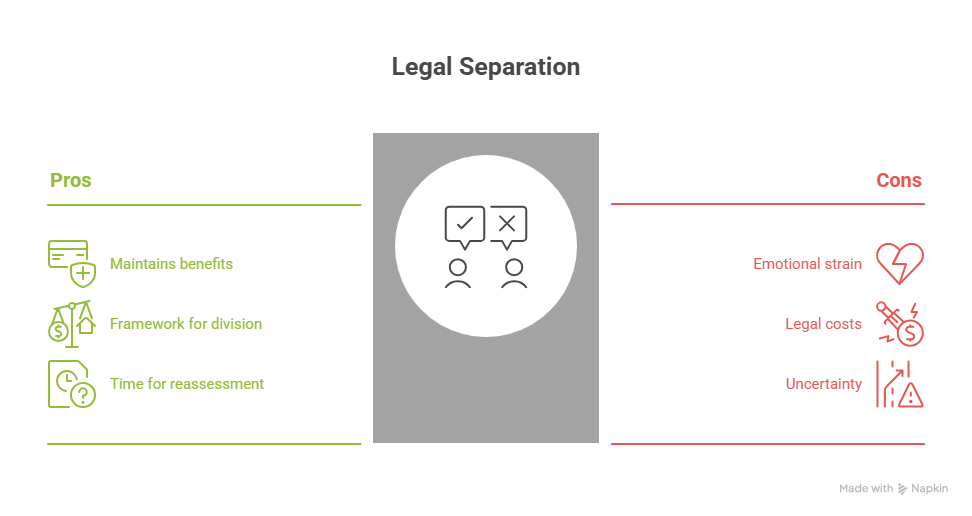Nearly 827,000 divorces were granted in the United States in 2020, according to the American Community Survey. Many couples facing marital issues consider alternatives to divorce, such as legal separation. But what sets these two options apart?
Understanding the differences between divorce and legal separation is crucial for couples navigating marital challenges. While divorce signifies the end of a marriage, legal separation allows couples to live apart while still being married.
Consulting a divorce lawyer or a legal separation lawyer can provide clarity on the best course of action. This article will explore the key differences between legal separation and divorce, helping you make an informed decision about your future.
Understanding Legal Separation and Divorce
In the midst of marital strife, understanding the nuances between legal separation and divorce is vital. Couples facing marital challenges must navigate complex legal decisions that can significantly impact their future.
What is Legal Separation?
Legal separation is a process where a couple decides to live apart while still being married in the eyes of the law. This arrangement allows them to separate their financial and personal responsibilities. A legal separation attorney can guide couples through this process, ensuring that their rights are protected.
What is Divorce?
Divorce, on the other hand, is the legal dissolution of a marriage, completely severing the marital bond. It involves the division of assets, custody arrangements, and other legal matters. Consulting a family law attorney can help individuals understand their rights and obligations during divorce proceedings.
Key Legal Differences
The primary difference between legal separation and divorce lies in their legal implications. Legal separation does not dissolve the marriage, whereas divorce does. Understanding these differences is crucial when deciding which path to take. The legal separation process can be a viable option for couples who wish to remain married for personal or financial reasons.
When to Consult a Legal Separation Lawyer
Navigating the complexities of legal separation can be daunting, making it essential to know when to consult a legal separation lawyer. Legal separation is a process that allows couples to separate while still being married, and it can be a viable alternative to divorce.
Benefits of Legal Separation
One of the primary benefits of legal separation is that it allows couples to maintain certain benefits, such as health insurance and social security benefits. A separation agreement can also provide a framework for dividing assets and debts, as well as arrangements for child custody and support.
Legal separation can be particularly beneficial for couples who are unsure about divorce or need time apart to reassess their relationship.

Drawbacks of Legal Separation
While legal separation has its benefits, there are also drawbacks to consider. For instance, legal separation can be costly and time-consuming, especially if both parties cannot agree on the terms of the separation.
Additionally, legal separation may not provide the same level of emotional closure as divorce, as the couple remains legally married.
The Legal Separation Process
The legal separation process typically begins with the couple creating a separation agreement that outlines the terms of their separation. This agreement is then filed with the court, which reviews and approves it.
In some cases, the couple may need to attend court hearings to resolve any disputes or issues related to the separation.
How a Legal Separation Attorney Can Help
A marital separation lawyer can provide invaluable guidance and support throughout the legal separation process. They can help couples create a comprehensive separation agreement, navigate the court system, and resolve any disputes that may arise.
By consulting a legal separation attorney, couples can ensure that their rights are protected and that the separation process is as smooth as possible.
Conclusion
Understanding the differences between legal separation and divorce is crucial for making an informed decision that suits your personal and financial situation. If you’re considering a legal separation in California, it’s essential to consult with an experienced separation lawyer who can guide you through the process and help you achieve the best possible outcome.
An experienced separation lawyer can provide you with personalized advice and representation, ensuring that your rights are protected and your interests are represented. By seeking professional advice, you can make a more informed decision and navigate the complexities of legal separation with confidence.
Whether you’re looking to separate from your spouse or divorce, having the right legal guidance can make a significant difference in the outcome. Take the first step towards resolving your situation by consulting with a qualified legal separation attorney today.
FAQ
What is the main difference between a legal separation and a divorce?
The primary difference is that a legal separation does not officially end a marriage, whereas a divorce does. In a legal separation, the couple remains married but lives separately, often with a separation agreement outlining the terms of their separation.
How do I know if I should consult a legal separation lawyer or a divorce lawyer?
If you’re unsure about ending your marriage or need guidance on the separation process, consider consulting a legal separation lawyer. They can help you understand your options and the implications of each choice. If you’re certain you want to end your marriage, a divorce lawyer may be more suitable.
What is the legal separation process, and how long does it take?
The legal separation process typically involves filing a petition, negotiating a separation agreement, and obtaining a court order. The duration varies depending on the complexity of the case, the level of cooperation between the parties, and the court’s schedule. A family law attorney can provide more specific guidance based on your situation.
Can I convert a legal separation to a divorce later on?
Yes, in many jurisdictions, it’s possible to convert a legal separation to a divorce. The process typically involves filing additional paperwork and meeting specific requirements. An experienced separation lawyer can advise on the specific steps and implications.
How does a legal separation affect property division and spousal support?
A legal separation agreement can address property division and spousal support, similar to a divorce. However, the specifics depend on the terms of the agreement and local laws. A marital separation lawyer can help you navigate these issues and ensure your rights are protected.
What are the benefits of hiring a legal separation attorney?
A legal separation attorney can provide expert guidance on the separation process, help you negotiate a fair separation agreement, and protect your rights. They can also offer valuable insights into the potential long-term implications of your decisions.

